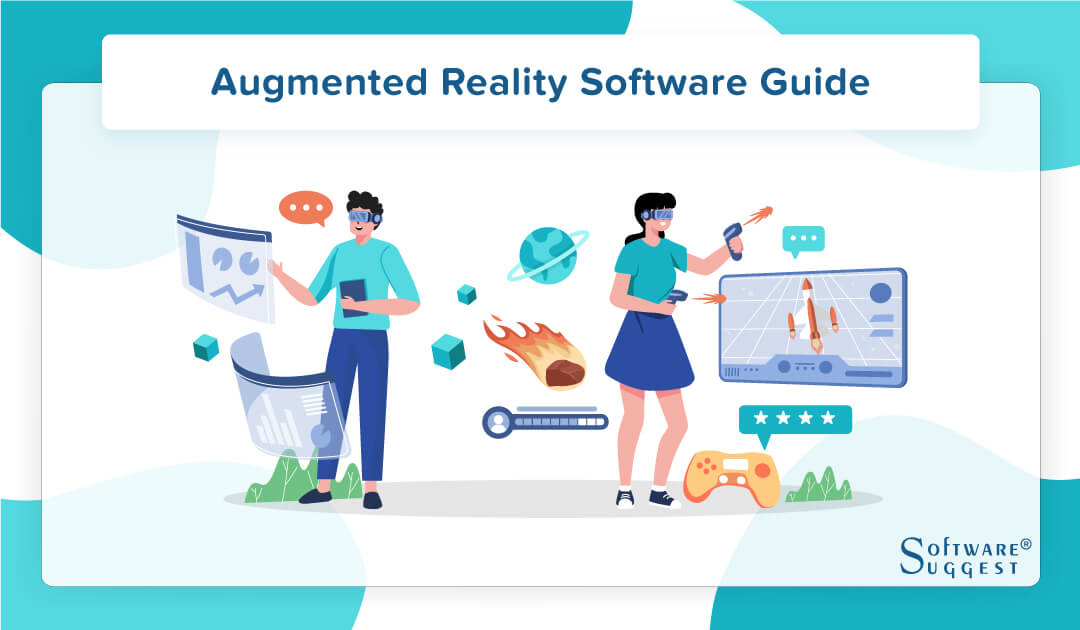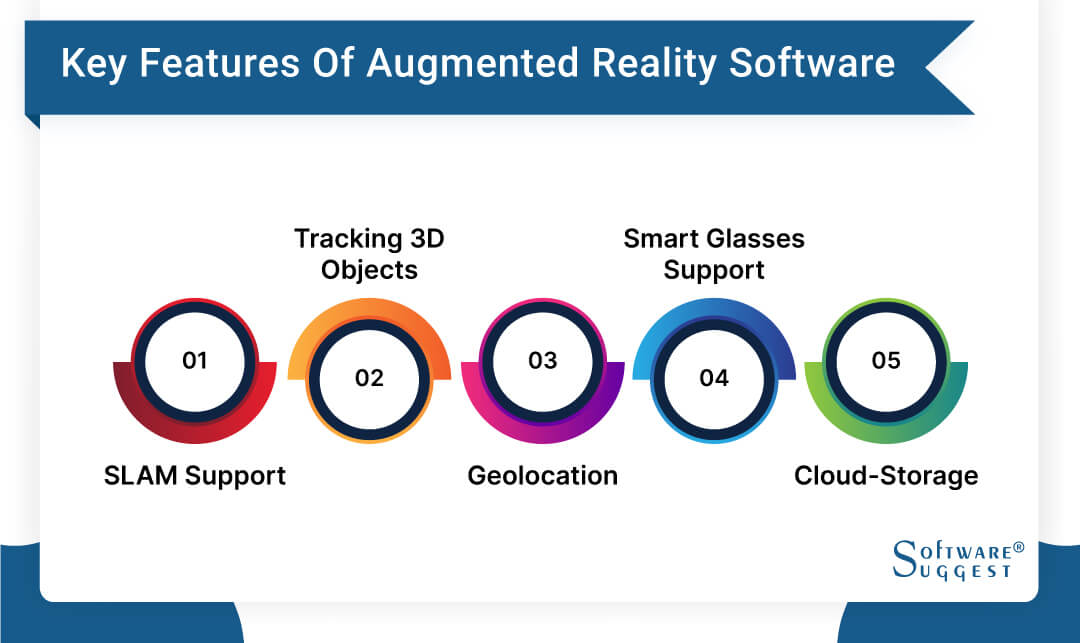Best Augmented Reality Software
Best Augmented reality software includes Coohom, Face Filters SDK, Augmania, inDE - Broadcast AR, and Microsoft Hololens. This software allows architects, marketers, educators, and game developers to view digital interactive content in a real-world context, such as images, buildings, books, and media objects.



No Cost Personal Advisor
List of 20 Best Augmented Reality Software
Contenders | 2024
Powerful Interior Design Tools with the Fastest Ph
Coohom is a fully featured Augmented Reality Software designed to serve Enterprises, SMEs and StartUps. Coohom provides end-to-end solutions designed for Web App and Android. This online Augmented Reality system offers 3D Objects, Content creation, Virtual Reality Integration, For Sales / Marketing and Drag & Drop at one place. Read Coohom Reviews
Explore various Coohom features, compare the pricing plans, and unlock the potential of seamless operations by selecting the right software for your business.
Features
View all Coohom Features- Augmented / Mixed Reality
- Usage Tracking / Analytics
- Immersive Training
- Content creation
- For Sales / Marketing
- Cross-Device Publishing
- Social Sharing
- Collaboration
Pricing
Pro Monthly
$ 30
Get started designing projects in just a few clicks.
Pro Yearly
$ 25
Advanced design capabilities with more projects and an expanded brand library
Premium Yearly
$ 84
Full design capabilities with uncapped projects and more 4K renders
Coohom Caters to
- StartUps
- SMBs
- Agencies
- Enterprises
Contenders | 2024
The most innovative Face AR technology
Enhance your customer's lives by introducing them to Instagram-like filters, lenses and face AR masks with the help of Banuba SDK. It works on both Android and iOS devices, can be easily integrated with other software and is well optimized for low-end mobile phones. Read Face Filters SDK Reviews
Explore various Face Filters SDK features, compare the pricing plans, and unlock the potential of seamless operations by selecting the right software for your business.
Features
View all Face Filters SDK Features- 3D Objects
- User Interaction Tracking
- For Sales / Marketing
- Augmented / Mixed Reality
- Content creation
- Social Sharing
Face Filters SDK Caters to
- StartUps
- SMBs
- Agencies
- Enterprises
Emergents | 2024
A dependable software for augmented reality
Augmania is an open source augmented reality software that designs end-to-end solutions for Web App. Augmania offers exciting features like 3D Objects to give enhanced customer experience. Besides this, the cloud-based software is equipped with mobile support, and compatible with various platforms. Learn more about Augmania
Explore various Augmania features, compare the pricing plans, and unlock the potential of seamless operations by selecting the right software for your business.
Features
View all Augmania Features- Content creation
- Social Sharing
- For Training / Education
- Drag & Drop
- Usage Tracking / Analytics
- 3D Objects
- For Sales / Marketing
- Augmented / Mixed Reality
Augmania Caters to
- StartUps
- SMBs
- Agencies
- Enterprises
Emergents | 2024
Phenomenal augmented reality software
INDE - Broadcast AR is an excellent augmented reality software for windows. Not just that, but the software is good to go with all other platforms like Macintosh, Android, iOS, etc. Also, it comprises a considerable set of features to provide the best help for a user. Learn more about INDE - Broadcast AR
Explore various INDE - Broadcast AR features, compare the pricing plans, and unlock the potential of seamless operations by selecting the right software for your business.
- For Sales / Marketing
- 3D Objects
- Simulation
- Virtual Reality Integration
- For Training / Education
- Drag & Drop
- Content creation
INDE - Broadcast AR Caters to
- StartUps
- SMBs
- Agencies
- Enterprises
Contenders | 2024
Software by Microsoft Corporation
Microsoft HoloLens is a mixed reality device that units unbound gadgets with apps and solutions to help users in communicating and collaborating work more efficiently. Microsoft Hololens is beneficial in many applications such as consumer, manufacturing, medical, education, and training. It is an advanced holographic computing device that provides a 3D virtual hologram experience to its users. Read Microsoft Hololens Reviews
Explore various Microsoft Hololens features, compare the pricing plans, and unlock the potential of seamless operations by selecting the right software for your business.
Microsoft Hololens Caters to
- StartUps
- SMBs
- Agencies
- Enterprises
Contenders | 2024
Software by Google Inc.
GOOGLE ARCore is Google’s simple yet powerful AR developer platform for delivering excellent AR experiences to its users in the real world. ARCore includes a variety of tools such as motion tracking that allows phones to understand and track the positions; environmental understanding which enables mobile devices such as tablets and smartphones to detect horizontal and vertical surfaces and planes. Google is focused on developing many applications related to its augmented reality platform. Read Google ARCore Reviews
Explore various Google ARCore features, compare the pricing plans, and unlock the potential of seamless operations by selecting the right software for your business.
Google ARCore Caters to
- StartUps
- SMBs
- Agencies
- Enterprises
Emergents | 2024
Software by Intel Corporation
Intel Augmented-Reality Headset overlays digital information on real-world elements and enhances with other digital details to supplement your reality or environment. Based on RealSense technology, Intel AR-Headset offers precise controls, amazing game physics and 360-degree 3D visuals, and immersive 3D sound. It is a performance-based device that delivers depth-sensing capabilities besides high-resolution image capturing. Learn more about Intel AR Headset
Explore various Intel AR Headset features, compare the pricing plans, and unlock the potential of seamless operations by selecting the right software for your business.
Intel AR Headset Caters to
- StartUps
- SMBs
- Agencies
- Enterprises
Emergents | 2024
Software by Vuzix Corporation
Vuzix is specialized in designing, manufacturing, and marketing AR-based smart glasses for consumers and enterprises to make everyone experienced about AR technology. Vuzix Blade AR Smart Glasses and Vuzix M-series Smart Glasses are having personal protective eyewear that provides a hands-free connection of the digital world to the real world. The display offers unprecedented access to location-based information, data collection, remote support communications with audio and video, and many more. Learn more about Vuzix Blade
Explore various Vuzix Blade features, compare the pricing plans, and unlock the potential of seamless operations by selecting the right software for your business.
Vuzix Blade Caters to
- StartUps
- SMBs
- Agencies
- Enterprises
Emergents | 2024
Software by Apple Inc.
APPLE is the world’s leading multinational technology company designing, developing, and selling computer software, hardware products, and online services. APPLE ARKit allows app developers to easily and rapidly develop AR experiences into their games and apps. ARKit is an Augmented Reality software that handles many AR-associated tasks such as detecting movement and simplifying the process for developers to place virtual objects in daily scene. It combines device motion tracking, camera scene capture, advanced scene processing, and display conveniences, etc. to deliver an excellent AR experience. Learn more about Apple ARKit
Explore various Apple ARKit features, compare the pricing plans, and unlock the potential of seamless operations by selecting the right software for your business.
Apple ARKit Caters to
- StartUps
- SMBs
- Agencies
- Enterprises
Emergents | 2024
Software by Toshiba Corporation
Toshiba offers dynaEdge AR Smart Glasses and Toshiba head mounted display. Experience the hands-free augmented reality with Toshiba’s AR smart glasses. It helps in enhancing efficiency, and operating flexibility of organizations. The product comes with developer’s kit with the required equipment for creating specialized applications. Learn more about Dynaedge
Explore various Dynaedge features, compare the pricing plans, and unlock the potential of seamless operations by selecting the right software for your business.
Dynaedge Caters to
- StartUps
- SMBs
- Agencies
- Enterprises
Emergents | 2024
Software by Visteon Corporation
Visteon offers AR capabilities to users for enhancing their driving experience. It also showed the usage of windshield and combiner HUD. The AR HUD carries out object recognition and gives worthy driving experience to drivers. Learn more about Visteon
Explore various Visteon features, compare the pricing plans, and unlock the potential of seamless operations by selecting the right software for your business.
Visteon Caters to
- StartUps
- SMBs
- Agencies
- Enterprises
Emergents | 2024
Software by Seiko Epson Corporation
Seiko Epson’s Moverio is a turn-key solution that supports a variety of industries' AR needs with a focus on comfort, quality, and durability. Moverio is a lightweight, flexible and hinge-based headset design suit for a broad range of head sizes to deliver a high-quality AR viewing experience. Moverio makes wearing comfortable even for several extended time periods. Moverio is powered by Si-OLED micro projection technology for quality images. Learn more about Epson Moverio
Explore various Epson Moverio features, compare the pricing plans, and unlock the potential of seamless operations by selecting the right software for your business.
Epson Moverio Caters to
- StartUps
- SMBs
- Agencies
- Enterprises
Emergents | 2024
Software by Inglobe Technologies
Inglobe Technologies supports companies with its virtual reality and Augmented Reality software and solutions. It helps creators, developers, and enterprises globally. With Inglobe AR, users can visualize the content anywhere and enhances the user experience. Learn more about Inglobe Technologies
Explore various Inglobe Technologies features, compare the pricing plans, and unlock the potential of seamless operations by selecting the right software for your business.
Inglobe Technologies Caters to
- StartUps
- SMBs
- Agencies
- Enterprises
Emergents | 2024
Software by Magic Leap, Inc
Magic Leap offers head mounted virtual retina display that apply to 3D computer generated image across real world things. These images can be used in real world by projecting them through digitized light field signal. The company also provides development kits for the developers. Learn more about Magic Leap
Explore various Magic Leap features, compare the pricing plans, and unlock the potential of seamless operations by selecting the right software for your business.
Magic Leap Caters to
- StartUps
- SMBs
- Agencies
- Enterprises
Emergents | 2024
Software by Marxent Labs LLC
Marxent Labs offers AR/VR furniture solutions for retailers and manufacturers. Its product visualization platform is majorly used for sales and marketing. Experience top class unique solutions for office furniture, outdoors, and bathroom. Learn more about Marxent Labs
Explore various Marxent Labs features, compare the pricing plans, and unlock the potential of seamless operations by selecting the right software for your business.
Marxent Labs Caters to
- StartUps
- SMBs
- Agencies
- Enterprises
Emergents | 2024
Software by Scope AR
Scope AR offers enterprise-class Augmented Reality software solutions and delivers cross-platform AR tools for workers as per their requirement. With the visual knowledge base solution offered by the company enterprises are able to conduct complicated remote tasks efficiently. The Worklink platform enables enterprise in observing and measuring worker’s performance along with the intuitive interface. Learn more about Scope AR
Explore various Scope AR features, compare the pricing plans, and unlock the potential of seamless operations by selecting the right software for your business.
Scope AR Caters to
- StartUps
- SMBs
- Agencies
- Enterprises
Emergents | 2024
Software by Niantic Inc
Niantic focuses on AR mobile games. The company develops the AR platform for current and future generation of AR hardware. With the Niantic AR platform users can directly interact with the shared world easily. The major products of Niantic AR include Pokemon Go, Ingress, and Harry Potter. Learn more about Niantic
Explore various Niantic features, compare the pricing plans, and unlock the potential of seamless operations by selecting the right software for your business.
Niantic Caters to
- StartUps
- SMBs
- Agencies
- Enterprises
Contenders | 2024
Software by Samsung Electronics Co., Ltd.
Samsung AR Emoji is the new and improved animated augmented reality emoji, perfect for displaying to your friends and family through messaging and other text platforms. There are two types of animated AR emojis available - My Emoji or your favorite cartoon characters. My Emoji is simple. You can create and use your own animated emoji and you can record videos and take on selfies using AR emojis as a mask mode. Read Samsung AR Emoji Reviews
Explore various Samsung AR Emoji features, compare the pricing plans, and unlock the potential of seamless operations by selecting the right software for your business.
Samsung AR Emoji Caters to
- StartUps
- SMBs
- Agencies
- Enterprises
Emergents | 2024
Software by Atheer Inc
Atheer provides augmented interactive reality platform. The platform acts as interactive gesture controlled 3D tool comprising Atheer smart glasses and Atheer OS. Enterprises can easily and quickly connect and assist the front line workers with this platform. For boosting productivity and managing workflow experience Atheer AiR platform. Learn more about Atheer
Explore various Atheer features, compare the pricing plans, and unlock the potential of seamless operations by selecting the right software for your business.
Atheer Caters to
- StartUps
- SMBs
- Agencies
- Enterprises
Emergents | 2024
Software by Qualcomm
Qualcomm®'s Snapdragon™ XR platform offers the powerful computing power to meet the growing needs of immersive AR applications. Snapdragon drives immersive audio and video solutions to several industries including industrial enterprise, training and education, healthcare, travel, entertainment, and many more. It offers a new level of immersive realism and replicates the same detailed images that the eye can see. Learn more about Snapdragon XR
Explore various Snapdragon XR features, compare the pricing plans, and unlock the potential of seamless operations by selecting the right software for your business.
Snapdragon XR Caters to
- StartUps
- SMBs
- Agencies
- Enterprises

What is Augmented Reality Software?
Augmented reality (AR) is an upgraded version of the real world achieved through digital visual components, sound, or sensory stimuli delivered via technology. it's a growing trend among corporations concerned with mobile computing and business applications.
Amid the increase of information assortment and analysis, one of the vital features to be performed is to focus on a specific aspect of the physical world, increase understanding of these aspects, and derive sensible and accessible insight that will be applied to real-world applications.
This kind of big data will facilitate companies to make the right and informed decisions. This way, business users may gain insight into shopper spending habits. The core functionalities include the following:
-
Augmented reality (AR) overlaps visual, auditory, or sensory data onto the planet and enhances users’ experience.
-
Retailers and corporations may use augmented reality to push merchandise or services, launch novel selling campaigns, and collect specific user knowledge.
-
Unlike virtual reality, which creates its cyber setting, augmented reality adds to the prevailing world as it is.
Augmented reality continues to develop and become pervasive among various applications. Since its conception, marketers and technology corporations have had to battle the perception that augmented reality is not just a selling tool. However, there's proof that buyers are realizing and utilizing the tangible advantages of this practicality and expect it as a part of their buying method.
For example, some early adopters in the retail sector have developed technologies designed to boost customer experience. By incorporating augmented reality into catalog apps, stores allow shoppers to visualize how different products appear in varied environments. For furniture, shoppers will point the camera at the good area, and the product will appear in the foreground.
Elsewhere, augmented reality’s advantages may touch the healthcare sector, where it may play away larger role. One of the techniques would be through apps that let users examine extremely detailed, 3D pictures of various body parts once they hover over their mobile device over a target image. For example, augmented reality may be a strong learning tool for medical professionals throughout their training sessions.
Some consultants have long speculated that wearable devices may be a breakthrough for augmented reality. On the other hand, tablets and smartphones show only a small portion of the user’s landscape. In contrast, smart eyewear, as an example, could offer a complete link between real and virtual realms if it is deployed properly.
Where can Augmented Reality be Used?
Nearly every business found ways to use augmented reality software to boost processes and outcomes. Common augmented reality applications are as follows:
-
Training and Education
Dynamic, AR-based directions let folks perform new tasks much more simpler and quicker than traditional coaching strategies (like instruction manuals). As wearable devices like AR-powered sensible glasses, AR contacts, and AR headsets become readily available, the potential for coaching via augmented reality will be tremendous.
-
Entertainment
Augmented reality has been enhancing recreation for years. In 2012, a pic of Tupac Shakur appeared onstage with Snoop Dogg at Coachella. Also, to adapt to the facts of the COVID-19 pandemic, a band called ‘Real Estate’ offered a “Quarantour,” which means an AR-powered tour to support the live shows that had to cancel due to worldwide quarantines.
-
Gaming
These days, dozens of different games incorporate AR components. The recognition of the rise in demand for augmented reality games is not of any surprise, as gaming was one of the foremost obvious early applications that several folks could recognize for AR and VR education capabilities.
-
Selling
Recently, it has become favorable to just about put on or try a range of merchandise before shopping with the help of augmented reality apps: Sephora’s app allows you to use cosmetics through AR on your face; IKEA offers an opportunity to see and feel your furniture at your home; paint brands will enable you to feel and see the colors on your walls; Lenskart makes it possible to “try on” glasses frames without having to visit a store.
Pre-pandemic, these offerings provided how to reinforce in-store experiences or make life easier for busy shoppers. Now, they have made it possible for several brands to sell products to customers stuck in their homes. AR applications for eCommerce platform has become widely popular.
Today, most of those augmented reality experiences are attainable by smartphones. However, developing many more advanced AR devices (like Apple’s AR glasses or Microsoft's Hololens) may open the door to the growth of several applications.
AR's benefits expand to new sectors, like health care, production, utilities, telecommunications, education, and public safety.
What are the Key Features to Expect from Augmented Reality Software?
As augmented reality apps become more popular, developers are curious about making their platforms to establish a software development kit (SDK) that provides them with mandatory options. While evaluating an augmented reality SDK, developers should consider multiple things. There cannot be just one SDK for augmented reality apps that matches the requirements of each development team.
However, there are some general features you must look for while considering an augmented reality

-
Tracking 3D Objects
3D object tracker will permit developers to make apps within which three-dimensional objects can be scanned and used as AR markers. An augmented reality SDK that will not have this feature would restrict many important options hindering the kinds of experience that development groups could offer their users. The advantages for app developers who implement 3D object tracking features are excellent. For example, a toy company may sell an action figure with the help of augmented reality Software, which might build the action figure to make users feel characters coming to life.
As technology improves in the future, it will make it possible for filmmaking applications to trace an individual or item’s movements and pose animations over them. Though not every SDK for augmented reality presently offers 3D object tracking, many already do.
-
Smart Glasses Support
Mostly augmented reality apps are designed for mobile devices. Users look at the “new” reality of the app through the screen of their phones or tablets. But this does not give an immersive experience because users can still see the real world anytime they are far from the screen. That’s why augmented reality software developers should bring down an augmented reality SDK that supports good glasses and different wearable technologies. As these become more popular, developers can offer users the app that will immerse them in its world.
-
SLAM Support
SLAM, also known as Synchronization Localization and Mapping, permits an app to plan an area and trail its movements. Ideally, the app would determine where specifically an object is in a determined area. Therefore the AR image would stay superimposed over it. This will additionally offer users the power to look at an object from multiple angles, and move nearer thereto or farther away, adding one more layer of immersion to the experience.
-
Geolocation
Pokemon Go clearly illustrated why geolocation is a necessary feature for an augmented reality SDK. Any development groups functioning on location-based apps would like this feature to insert different computer game pictures into the user’s view of the world reckoning on their current location.
Geolocation is not only helpful for developing games. Businesses, as an example, may produce AR apps that determine a user’s location, providing them with targeted advertisements and virtual signposts guiding them to their business. Snapchat is another popularly used app that does a similar thing with their Geofilters; however, those lack the engagement of AR. Meanwhile, an academic augmented reality app may offer users a virtual tour of a historical website, superimposing pictures over it to point out how life looked many years ago.
-
Cloud-Storage
Developers who need to unharness an app that acknowledges varied 2nd markers must have an augmented reality SDK that provides cloud storage. Without it, the quantity of features the app will recognize is proscribed. SDK for augmented reality that provides cloud-based storage can fleetly save markers to the cloud, allowing developers to make apps that offer users a wider experience.
No explicit augmented reality SDK is good for all development groups. Whereas these available options are helpful to most developers, finding the proper augmented SDK for your desires needs assessing your budget, goals, and target market. Consulting a knowledgeable source in augmented reality SDK is another wonderful choice to work out the simplest option for you.
Things to Keep in Mind While Implement Augmented Reality
-
AR practicality should continue to exist on your website, not just on a dedicated AR app: Customers do not wish to use just an app to use AR options. To relish the sales boost AR options can give, eliminate unnecessary hurdles to utilize them.
-
AR-generating computer code will prevent time, energy, and money: A few years ago, if a brand needed AR for their businesses, they had to make the functionality from scratch. Various computer or cloud-based software is available today, making it possible to develop AR content with a Software as a Service model. This makes the way to augmented reality even more powerful, faster, and accessible.
-
Build AR for smartphones: Again, if you would like AR's advantages, you have to maximize the chances that your customers can use it. It means making AR experiences accessible with the most commonly used gadgets, such as smartphones (iPhones and Android).
Related Research Articles:
FAQs
Augmented Reality needs a mobile device, permitting users to engage with AR content simply by observing their screen. Virtual Reality can only be experienced by using a specific VR device, for instance, a VR headset. AR blends with both the real and virtual world, whereas VR provides a completely virtual/closed environment.
- Marker-based AR: Marker-based AR is tied to a specific physical image pattern marker to position the virtual 3D animation, object, or text in real-world surroundings.
- Markerless AR: Markerless AR refers to the application that doesn't need cameras to mark image pattern recognition.
- Location-based AR: Location-based AR predicts the user’s focus as a trigger to combine real-time information with the location.






















